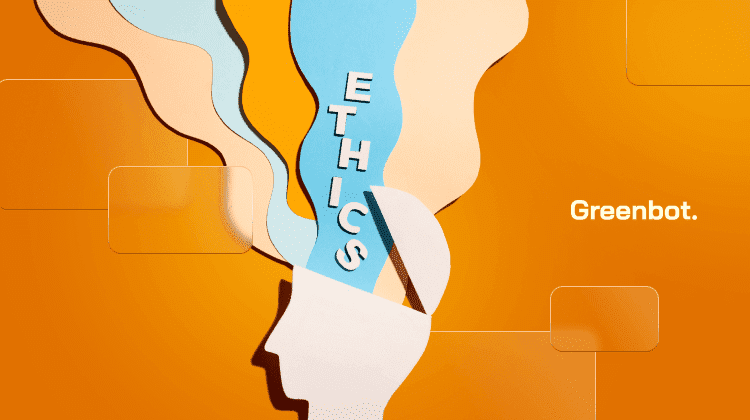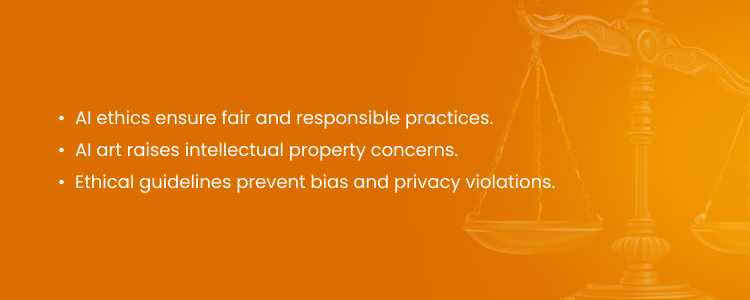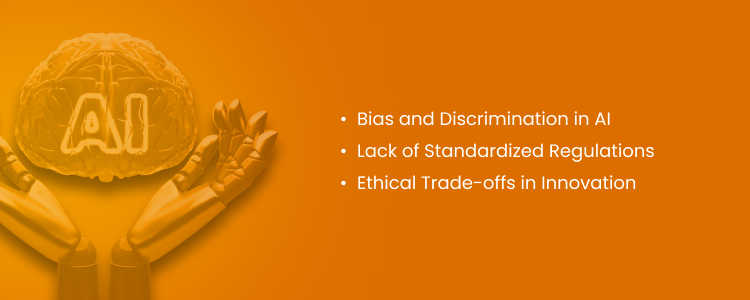
Artificial intelligence is becoming a larger part of daily life. It helps with decision-making in healthcare and finance. However, it also brings ethical challenges, with cases showing how its development has crossed ethical lines.
As AI continues to grow, ethical regulations are crucial. They ensure AI aligns with human values and ethical principles. In this article, we’ll explore the principles of AI ethics. We’ll discuss why they matter and outline steps to ensure a safe and responsible future as AI evolves.
What is AI Ethics?
AI ethics refers to principles that guide how artificial intelligence systems are built and used. They aim to ensure responsibility, align with societal values, and reduce harm to human beings.
Although ethics can differ between groups, some standards remain essential. These include fairness, transparency, privacy, and accountability. For instance, AI systems in healthcare must provide accurate diagnoses. Recruitment algorithms must also avoid unfair biases that could lead to discrimination.
Governments and companies need to address ethical concerns in AI. The first step is recognizing the harm AI has caused and the risks it poses. This acknowledgment defines the boundaries AI developers have to follow when designing systems. Adaptive governance is also key to preventing misuse by end-users.
Ultimately, AI ethics ensure progress and respect human behavior and values. By prioritizing fairness and safety, AI developers can tackle ethical dilemmas. They can also prevent ethical issues that worsen existing inequalities.
Why is AI Ethics Crucial Today?

Every system needs ethical practices, and AI is no exception. This makes AI ethics especially important today. AI systems serve specific purposes, like art generators creating works from datasets of human art. However, many of these datasets include uncopyrighted works. The AI-generated art is often credited to AI, raising questions about intellectual property rights.
Another reason AI ethics matter is their impact on key healthcare, finance, and public safety decisions. Without guidelines, these systems risk amplifying biases, violating privacy, and losing public trust. For example, biased AI in hiring can unfairly favor some groups. This creates workplace inequality.
UNESCO states that AI decisions are vulnerable to inaccuracies, bias, and discrimination. For instance, Amazon’s now-discontinued hiring AI favored male applicants. It was trained on historical data that reflected more male software developers. Cases like this show why companies must follow ethical guidelines during AI development.
Principles of AI Ethics
AI has no universal ethical principles, but it has to prioritize human rights and moral principles. Companies committed to AI ethics often work with legal advisors and human rights experts. This ensures their systems follow accepted norms and respect fundamental values.
Here are key principles of AI ethics essential for ethical development and responsible use:
- The Well-being of Humans. AI should improve human lives and positively impact society. It must avoid harm, such as reinforcing biases or causing critical errors in healthcare or finance. Instead, it should contribute to humanity’s welfare.
- Transparency. AI systems should clearly explain how they work. This includes their decision-making processes, algorithms, and data sources. Transparency builds trust and accountability. Without it, AI risks becoming an uncontrollable “black box.”
- Fairness. AI has to treat everyone equally, avoiding bias in design and application. For example, Amazon’s hiring tool shows the need for careful development to prevent discrimination.
- Privacy and Security. Protecting user data is crucial. AI systems have to handle sensitive information responsibly. They must comply with privacy laws and guard against misuse or breaches. Users need to feel secure when interacting with AI.
- Accountability. Developers and deployers must take responsibility for AI outcomes, whether positive or negative. Mechanisms should exist to address errors or harm and ensure accountability for impacts.
- Inclusivity. AI has to cater to everyone, avoiding exclusion or marginalization. It should show diverse cultural, social, and economic views. It must also be accessible to people with different abilities.
- Safety. AI systems must operate securely and predictably, minimizing risks to people and the environment. Safety should remain a top priority, from testing applications to preventing misuse.
Key Challenges in AI Ethics

Let’s go over some of the key challenges surrounding AI ethics below:
Bias and Discrimination in AI
AI systems often inherit biases from their training data. These biases can lead to discriminatory outcomes that undermine human dignity. For example, biased hiring algorithms may exclude qualified candidates from some demographic groups. Such issues violate ethical norms and reinforce social inequalities, challenging AI’s fairness principle.
The ethical impact of biased AI goes beyond inconvenience. In sectors like healthcare or criminal justice, it can cause real harm. AI companies must curate data, use diverse datasets, and monitor their systems. This will help ensure AI promotes inclusivity and respects human rights.
Lack of Standardized Regulations
The lack of universal regulations for AI development and deployment creates ethical gaps. Companies often follow inconsistent guidelines, leading to misuse of AI systems. This inconsistency raises accountability concerns when AI harms individuals or invades privacy.
Without standardized rules, technology could outpace ethical safeguards. Governments, developers, and stakeholders must work together to create global frameworks. These frameworks would ensure AI systems prioritize human well-being and ethics.
Ethical Trade-offs in Innovation
Trade-offs in AI innovation present a controversial challenge. Advancing AI often involves pushing boundaries, which can clash with ethical principles. Facial recognition improves security but raises privacy and misuse concerns in surveillance.
Balancing innovation with ethics requires careful consideration. AI progress has to respect values like autonomy, privacy, and fairness. Developers and policymakers must ensure this and also manage risks.
Stakeholders’ Role in Promoting Ethical AI
Governments and Policymakers
Governments and policymakers play a critical role in AI ethics. They create rules to ensure responsible AI development and use. The EU AI Act is an example, though implementation remains a challenge.
Collaboration with industry leaders, ethical bodies, and civil society is essential. Together, they can establish frameworks that protect human rights, privacy, and fairness. Clear guidelines help AI technologies benefit society without infringing on individual freedoms.
Technology Companies and Developers
Technology companies and developers are at the forefront of ethical AI. They have to prioritize ethics from the start. They should audit for bias and ensure data use and algorithm design transparency.
Building diverse teams, including legal and human rights professionals, is crucial. Diverse perspectives help create innovative AI solutions that align with societal values. This proactive approach builds trust with users and the public.
Civil Society and Advocacy Organizations
Civil society and advocacy groups hold governments and tech firms accountable for their AI practices. They push for strong ethical standards and demand transparency in AI development.
Monitoring AI deployments and raising awareness of potential risks ensure AI benefits society. Their work shapes public policy and promotes responsible AI development.
Global Frameworks for AI Ethics
Global Frameworks for AI Ethics
Ethical AI frameworks ensure fairness, accountability, and respect for human rights. UNESCO’s guidelines urge countries to adopt national AI policies. They promote sustainability, dignity, and diversity. These efforts address bias and misuse globally.
IBM emphasizes trust with its Ethical AI Guidelines. They focus on transparency, fairness, and accountability. Tools like AI FactSheets help businesses create explainable, unbiased AI systems.
SAP also integrates ethics into development with its AI Ethics Framework. Employee training ensures ethical practices align with innovation.
All frameworks, despite their differences, share common goals. They aim to reduce bias, promote fairness, and build trust.
How to Ensure Ethical AI Practices
- Foolproof AI Systems: Design AI with care in training data and algorithms to avoid bias. Regular testing and validation ensure decisions are fair and accurate.
- Bias Audits. Conduct frequent audits to find and fix biases in the training data and algorithms. This will prevent unfair outcomes.
- Diversity in Teams. Build diverse teams to bring varied perspectives to AI development. Include legal experts, human rights professionals, and specialists. They can help manage and enforce ethical standards.
- Transparent Processes. Ensure transparency from design to deployment. Share data sources, algorithms, and decision-making processes to build trust.
- Continuous Ethics Training. Provide ongoing ethics training for developers and managers. Equip them to handle issues like bias, privacy, and security responsibly.
- Compliance Monitoring. Use systems to monitor compliance with ethical guidelines. Regular audits by independent bodies ensure standards are upheld.
- Stakeholder Engagement. Include users, ethicists, legal experts, and community representatives in the development process. Early involvement addresses concerns and aligns AI with public values.
- AI Regulation. Collaborate with governments, industry leaders, and ethical bodies to create adaptable regulations. These ensure responsible AI development that safeguards human rights and fairness.
The Future of AI Ethics
AI is becoming a part of everyday life, making global cooperation essential. Unified frameworks can tackle bias, privacy, and accountability. These efforts ensure AI systems are fair and respect human rights everywhere.
Stronger regulations will also play a key role. Clear standards for developers and users can prevent unethical practices. This is vital in healthcare, finance, and hiring, where mistakes can have major impacts.
Ethical tools, such as explainable AI (XAI) and algorithm audits, will support these efforts. By focusing on planning, research, and strong standards, we can align AI with human values and reduce risks.
FAQs About AI Ethics
What are the key principles of AI ethics?
The main principles are fairness, transparency, accountability, privacy, and reducing harm. They ensure AI systems are used responsibly.
Why is AI ethics important?
It plays a key role in building trust, ensuring safety, and preventing harm while promoting fairness and respect for human rights.
What challenges exist in implementing AI ethics?
Regulatory gaps, bias, and the need to balance innovation with ethics across industries are the biggest hurdles.
Can AI ever be truly ethical?
AI can’t be perfectly ethical, but careful design, monitoring, and ongoing improvements can make it align closely with human values.
How can governments and academic institutions support AI ethics?
Governments can regulate the ethical use of AI to ensure fairness and safety. They can also set guiding principles to mitigate risks like bias and misuse. Academic institutions contribute by researching ethical frameworks. They also teach digital skills to address these concerns.
What role do large language models play in AI ethics?
Large language models like GPT are powerful tools but raise ethical issues. These include bias, deepfakes, and their role in political campaigning. Many organizations work to ensure these models are ethical and low-risk. Developers must focus on transparency and control to prevent harm.
How does AI ethics promote social justice?
AI ethics addresses bias and reduces existing inequalities. Ensuring the ethical use of AI protects marginalized groups and fosters social justice.
Conclusion: A Responsible Future for AI
AI ethics are vital for fairness, safety, and accountability. They address issues like bias and privacy violations. Developers must consider the societal impact of innovations, such as facial recognition. It has been criticized for inaccuracies and discrimination. Ethical guidelines ensure fairness and inclusivity.
Building a responsible AI future requires developers, policymakers, and society collaboration. This united effort creates technologies that respect human rights and foster trust. By prioritizing ethics, we can ensure AI benefits humanity while upholding fairness and values.























